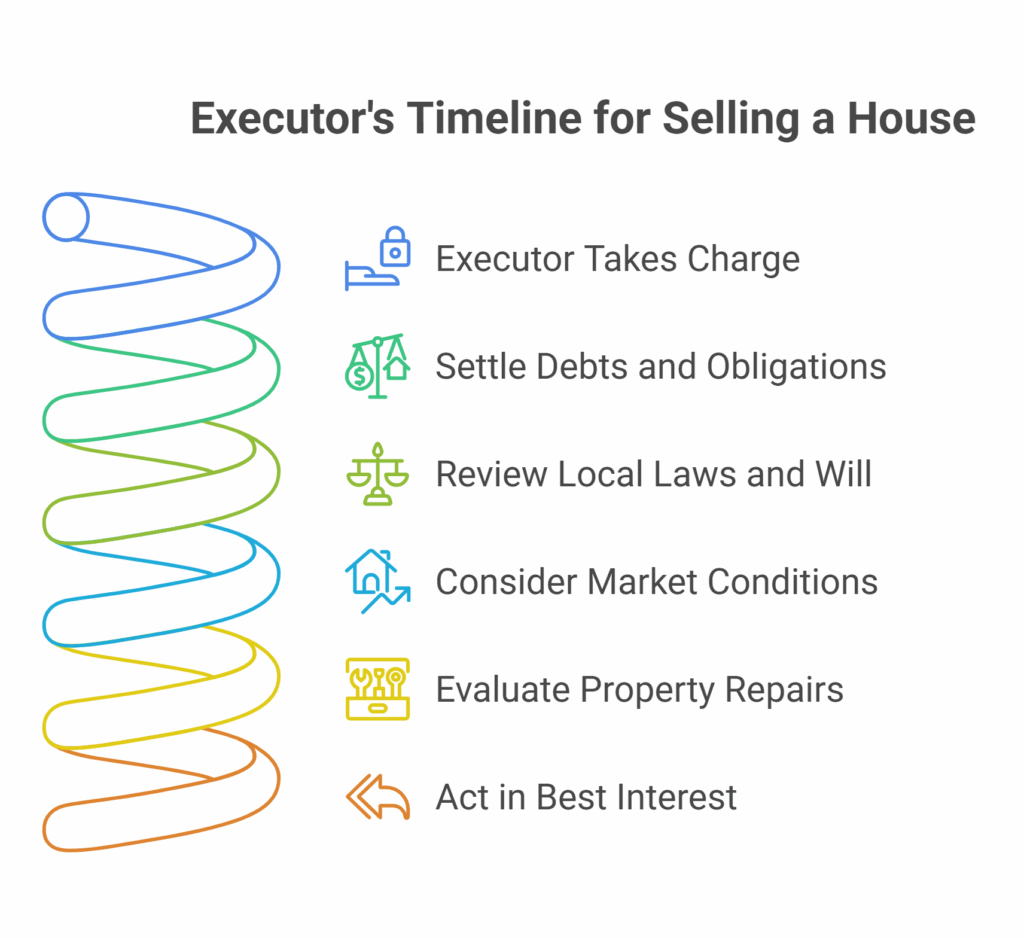Quick Answer: How Long Does an Executor Have to Sell a House?
How Long Does an Executor Have to Sell a House? The timeline varies depending on state laws, probate court requirements, and the complexity of the estate. Generally, executors are expected to act in a “reasonable” time frame, which often means several months to over a year.
Factors like settling debts, obtaining court approvals, and handling disputes can extend the process. Executors should keep beneficiaries informed and work diligently to avoid unnecessary delays while fulfilling their legal duties.
Now let’s dive deeper.

What Does an Executor Do?
It is the executor who is stipulated in a will to perform the final act to ensure promises have been fulfilled to the old owner. By the term, an executor gathers properties and pays off debts, files the tax, and spends what is left on the rightful heirs. However, the selling of a house can become part of the executor’s duty, that is, to pay the debts that have been left behind or equitably divide the inheritance.
Being the executor may be a good thing or a bad thing, but the wily executor at the coffee table typically muses, “How much time does an executor have to sell a house?” Now, if they don’t know yet and the questions start pouring in, very politely remind them that it’s none of your business because the answer isn’t simply as direct as one could hope for.
The Timeline for Selling a House in Probate
The time frame of an executor to sell the property can vary greatly depending on the legal requirements, estate complexities, and—most notably—the market pace of real estate locally. Below entails or ranges generally expected.
1. The Probate Process Begins (1–3 Months)
Before a home could be listed for sale, the executor should have been officially recognized by the probate court. This includes the probate of the will, the appointment of the executor by the court, and sometimes, dealing with disgruntled family members who believe that they are entitled to more than they received.
2. Securing and Maintaining the Property (1–2 Months)
After obtaining control of the estate, the executor must decide to secure the home, handle any required maintenance, and ensure the home does not become an abandoned, ghosted dwelling before selling. Utilities may be needed to remain on, and the estate would need to be maintained to keep its value constant.
3. Property Appraisal and Market Preparation (1–3 Months)
An appraiser helps determine the actual value of a home, which is very important to that agent and attorney for setting the right listing price so the beneficiaries can never come back and say the executor gave the home away for pennies. However, this may cost some money, and the appraiser will find some minor repairs or cosmetic touch-ups, which might help to stimulate the buyer’s interest in acquiring the home.
4. Listing and Selling the Property (3–6 Months or More)
After the house is prepared, it will be put on the market. It might be there on one sunny day and go on the next day, depending on the market or seasonal conditions. Executors weigh closure with the best offer while pacifying impatient heirs.
5. Closing the Sale and Distributing Proceeds (1–3 Months)
Once you find a buyer, the next step is to wait for closing and complete the paperwork and other legal formalities. The will executor must then apply funds to the remaining debts and distribute the balance among the beneficiaries via legal procedures. The moment things start moving swiftly, your case will come to a close pretty soon-at least in the best-case scenario. If disputes arise, however, you must be prepared to run a long race.
What Can Delay the Sale?
Even if the executor is ready to sell the house, certain factors can drag out the process:
- Legal Disputes: If heirs contest the will, the property sale may be delayed until the court resolves the matter.
- Real Estate Market Conditions: A slow market means longer wait times for the right buyer.
- Tenant Occupancy: If the property is rented, the executor may need to navigate lease agreements before selling.
- Complicated Liens or Debts: Outstanding mortgages, tax liens, or creditor claims can slow things down while being resolved.
Do Executors Have a Deadline to Sell?
There is no strict national deadline, but usually, courts require that executors act with alacrity. Most probate cases scroll to an end within six to eighteen months, but in some states, beneficiaries can apply to the courts in cases where the executor delays acting. Long delays only add to expenses, leaving little to distribute at the end of the day.
Final Thoughts
As an executor relief, we can lessen your stress, especially during the sale of probate property. Very experienced in helping executors dispose of properties fast and efficiently with no hassle of endless paperwork, market uncertainties, or fights amongst heirs. Whether you are looking to sell your house fast in El Paso, Texas, or looking for professional advice to make sure everything is in order, we will assist you. With all this in view, it is attempting to keep this process as simple as possible because dealing with family drama alone is already dense, so let us not make real estate, too.
Call us anytime at 713-561-5162 or connect with us on our website and we’ll lay out all of your options for your specific situation.
